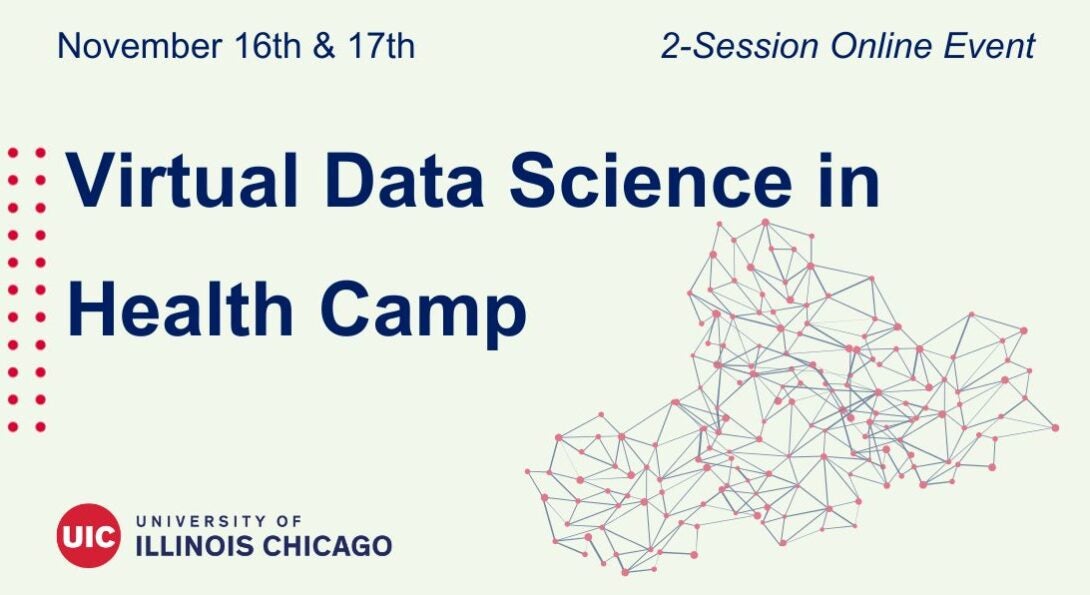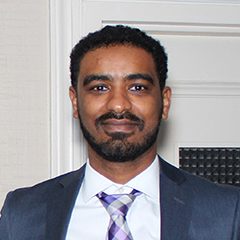Data Science in Health Camp

About Our Camp
The University of Illinois Chicago welcomes students to join its Free Virtual Data Science in Health Camp.
Held over two sessions on November 16th and 17th, this FREE online camp will introduce students to emerging challenges at the intersection of Big Data, Statistics, and Human Health. Students will be introduced to what big data looks like in the field of public health, exploring general concepts of artificial intelligence (AI) and machine learning, and learning how to manage, analyze, and visualize health data using popular software packages R, Rstudio, and HELIX.
Lectures will be led by a diverse group of stellar biostatistics faculty at the UIC SPH.
If you are a third- or fourth-year undergraduate student, or a recent graduate interested in studying quantitative analysis, big data, and/or human health at the graduate level, click the “Apply” button below and submit for this tremendous opportunity!
Apply Today!
Session Content
Students will complete five sessions. In general, the format of each session is 50-55min of presentation and 20-25min hands-on practice.
About Session 1
Students receive an overview of the course and an introduction to big data in public health; artificial intelligence; machine learning; large language model; high dimensional data; and HELIX Data . Students will dive in by installing R and Rstudio.
About Session 2
Data visualization uses visual displays of information to communicate complex data relationships and insights in a way that is easy to understand. Students will be introduced to how to pre-process data (including how to address missing values), conduct descriptive analysis, prepare data visualization, and complete bivariate analysis with consideration to different variable types (e.g., continuous vs. categorical).
About Session 3
Predictive analytics is an advanced form of data analytics that attempts to answer the question, “What might happen next?” Students will learn about multivariate analysis and regression models, and considerations for high dimensional data, as well as how to interpret and draw conclusions.
About Session 4
Machine learning (ML) is a branch of artificial intelligence (AI) and computer science that focuses on the using data and algorithms to enable AI to imitate the way that humans learn, gradually improving its accuracy. Students will review basic concepts of machine learning, predictive analytics, decision trees, deep learning (neural networks), and random forest, a commonly-used machine learning algorithm.
About Session 5
Students will learn more about ways to expand their knowledge and skills in health data analysis.
Meet Your Instructors

Saria Awadalla, PhD
Assistant Professor of Biostatistics
Division of Epidemiology and Biostatistics

Sanjib S. Basu, PhD
Paul Levy and Virginia F. Tomasek Distinguished Professor
Professor of Biostatistics
Division of Epidemiology and Biostatistics

Runa Bhuamik, PhD
Research Assistant Professor
Division of Epidemiology and Biostatistics

Li Liu, PhD
Associate Professor of Biostatistics
Division of Epidemiology and Biostatistics

Jiehuan Sun, PhD
Assistant Professor of Biostatistics
Division of Epidemiology and Biostatistics

Meida Wang, PhD
Assistant Professor of Biostatistics
Division of Epidemiology and Biostatistics

Rrita Zejnullahi, PhD
Clinical Assistant Professor of Biostatistics
Division of Epidemiology and Biostatistics